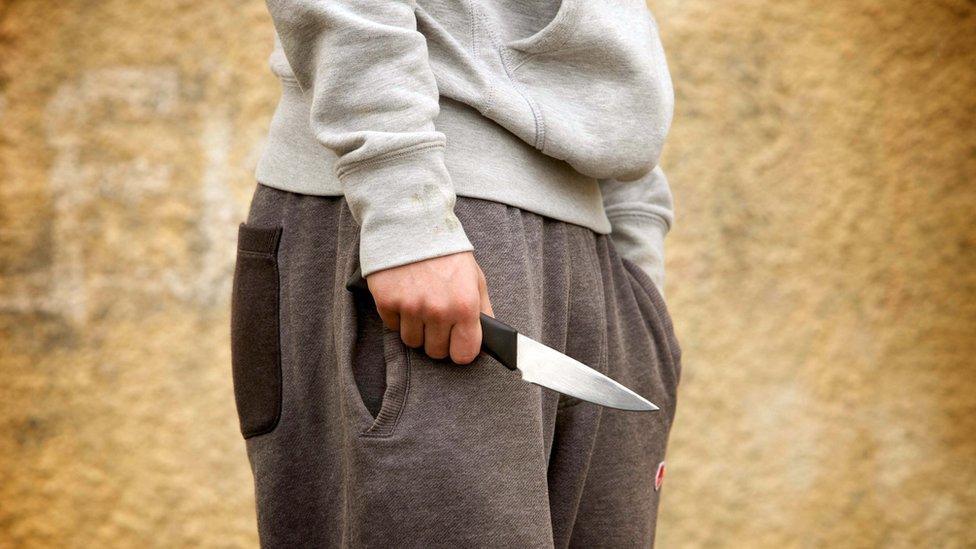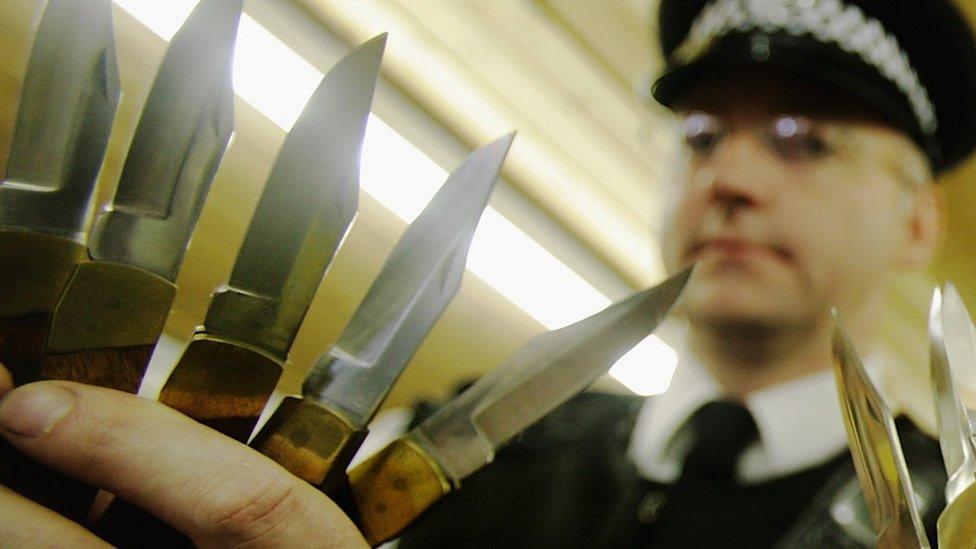Knife crime: Number of offences at nine-year high
- Published
Knife crime: What's it like to be stabbed?
The number of crimes related to knives and other offensive weapons dealt with by the criminal justice system reached a nine-year high in 2018, figures show.
The Ministry of Justice reported a total of 21,484 offences in England and Wales, the equivalent of 59 every single day.
Of all those convicted or cautioned, just over a fifth were under 18.
The figures show 37% of all offences led, external to an immediate jail sentence, compared with 23% in 2009.
Cautions and fines are only half as likely to be used now as they were in 2009.
The average length of custodial sentences classed as "immediate" - therefore not including suspended sentences - was 8.1 months last year. That is the longest average term since comparable records began in 2008.
The MoJ figures cover not just knives, but other offensive weapons such as deliberately broken bottles, sharpened screwdrivers, knuckle dusters and corrosive liquids.

Victims in 2019

Motives and circumstances behind killings have varied - as have the age and gender of the victims.

The annual figures have been published following a spate of fatal stabbings, including the killings of three 17-year-olds in less than a week earlier this month.
And it is a day after police have been promised an extra £100m by the government to help them tackle a knife crime in England and Wales.
The government has said offenders are now more likely to go to jail for knife or offensive weapons crimes.

Seventeen-year-olds Jodie Chesney, Yousef Ghaleb Makki and Ayub Hassan were all stabbed to death
Justice Minister Rory Stewart said: "Knife crime destroys lives and shatters communities, and this government is doing everything in its power to tackle its devastating consequences.
"Sentences for those carrying knives are getting tougher - they are more likely to be sent straight to prison - and for longer - than at any time in the last decade."

Responding to the figures, Labour's shadow home secretary Diane Abbott said: "Surely the Tories don't need any further evidence that not enough is being done to tackle knife crime?"
She called on the government to "stop talking" about its approach to fighting knife crime and said it should instead "properly" fund the police and youth services.

In Scotland, which has a separate legal system, the number of offences of handling offensive weapons recorded by Police Scotland, external between April and September 2017 was 4,060 - nearly double the figure measured for the same period four years earlier.
A separate report by the Scottish government, external last year said the proportion of convictions resulting in a custodial sentence had "generally fluctuated" between 30% and 40% between 2007-08 and 2016-17.
In Northern Ireland, the number of offences of handling offensive weapons recorded by Police Service Northern Ireland, external between February 2017 and February 2018 was 970 - a rise of 9% on the previous year's figures.
A separate government report published last year, external said 20% of all convictions in Northern Ireland in 2017 that were related to possession of weapons resulted in imprisonment.
- Published10 March 2019

- Published7 February 2019

- Published18 July 2019